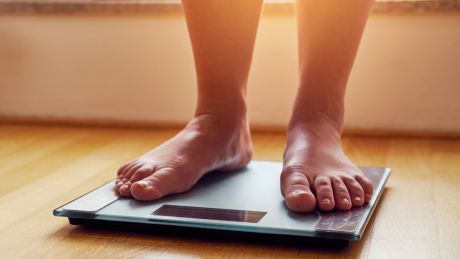If Your New Year’s Resolution Is To Lose Weight, Then Make Losing Weight Easy
New book Tiny Habits says making small, easy changes is the most effective way to change

Sign up for workout ideas, training advice, reviews of the latest gear and more.
You are now subscribed
Your newsletter sign-up was successful
We all wish it was easy to change and rid ourselves of bad habits, but most people’s experiences are that change is hard. But what if we were looking at it the wrong way all this time? What if the key to change was to make it stupidly easy? That’s one of the revelations from BJ Fogg’s Tiny Habits (published by Virgin Books), a new book that shares a model of behaviour many at Silicon Valley’s biggest companies have known about and been using for more than a decade.
Coach to spoke to Fogg, the Stanford University behaviour science expert, about that, as well as how his method can be applied to weight loss and New Year’s resolutions.
How did Tiny Habits come about?
I’m a behaviour scientist, but Tiny Habits didn’t come out of academic lab experiments. I did it in my own life for a year or so and then I started teaching others – anywhere from two to 400 people a week, some in person but mostly on email – for seven years. Week after week I was measuring and testing, then it became more of a research project.
How does the Tiny Habits system compare to the traditional methods of behaviour change?
Tiny Habits is radically different. Pick what you want, not what you should do. The old-fashioned way was like pick something you should do and then just figure out a way to stay motivated. In Tiny Habits, you don’t have to set a goal or track your behaviour. You can, but you only do those two things if they help you feel successful.
The old-fashioned way really focuses on repetition, like if I just suffer for 66 days in the gym then I will magically have this habit, but that’s not how it works. In Tiny Habits, it’s not about suffering, it’s about feeling good. What I figured out – and now it’s so obvious, but it wasn’t then – is you wire in the new habit by feeling a positive emotion.
I teach the technique I call celebration. You focus on feeling positive as you’re taking a drink of water or getting out your dumbbells. You can wire in habits really fast through emotion.
How did you use your techniques to lose 20lb (9kg)?
I figured out a whole bunch of different eating behaviours that were really easy to do, but also, that I wanted to do. It’s the combination of finding new habits you want and then making them really easy to do. And in this case for weight loss, I finally figured out that so much was about nutrition, so I focused on nutrition primarily, but I also did resistance training. For me, that combo works.
Sign up for workout ideas, training advice, reviews of the latest gear and more.
Is there a problem that people experience when losing weight that the Tiny Habits system fixes?
Number one, it helps you see it’s really easy to get started. And it’s no big deal. You’re not making this dramatic overhaul of your life and you can do it on the sly. I found out that for some people this matters. Somebody will try to eat differently and their spouse will sabotage them because they don’t want to eat healthy foods too.
The other thing is you can start succeeding immediately. That’s not to say you succeed on the scales, but you can start succeeding in developing good nutrition and exercise habits immediately and you accumulate them.
Not everything will work and that’s OK. I have an orange tree and it always has oranges on it, so I thought eating an orange every day for lunch would be a good habit. I started and it just wasn’t working, it was too much orange for me. So even though it sounded like a good idea and I could make it a habit, as I got going I was like “No, this is not the right habit for me”. So I stopped. Part of the method is try stuff. If it’s not the right habit for you, stop, no big deal. Do something else.
See related
- 13 Expert Weight-Loss Tips
- High-Fibre Foods To Help You Lose Weight And Get Healthier
- Is It Worth Paying More For Healthy Snacks?
Where do people go wrong when it comes to New Year’s resolutions?
At New Year’s, you want to do big hard things and you feel capable of doing big hard things. What humans are terrible at is looking ahead and understanding our motivation is going to drop. When our motivation drops, we can no longer do the hard thing. So in some ways, the whole excitement about New Year’s resolutions sets you up to fail. One thing Tiny Habits does so well is make change really, really, really tiny so you don’t have to have lots of motivation.
How are some of the themes in Tiny Habits used by social media platforms?
Let’s talk about the psychology here. The pattern [in social media platforms] is, and this totally maps to the book, help people do what they already want to do. That’s what every successful social media platform has done and that is my first maxim in the book: do what you already want to do. Pick new snacking habits you want, but also make it healthy. Don’t force yourself to eat kale if you don’t like kale.
Then next is to make it really easy. One of my former students is the co-founder of Instagram. The idea for it started in my class at Stanford. We talked a lot about how to make things really easy. That was the point. Simplicity changes behaviour.
And then – I’ll just add one more – the next is to help people feel successful. With Instagram, I think what they did brilliantly is that when you take a picture, you apply a filter. And as you apply a filter you’re seeing not just your picture, you’re seeing an artistic creation, and that’s like, Wow. That is sparking the emotion of success which then wires in the habit. There’s more, but I would say those are the primary ones. Help people do what they want to do, make it simple and help people feel successful.
Buy Tiny Habits on Amazon | £14.99 (currently reduced to £10.29)

Jonathan Shannon was the editor of the Coach website from 2016 to 2024, developing a wide-ranging experience of health and fitness. Jonathan took up running while editing Coach and used the training plans on the site to run a sub-40min 10K, 1hr 28min half marathon and 3hr 6min marathon. He’s an advocate of cycling to work and is Coach’s e-bike reviewer, and not just because he lives up a bit of a hill. He also reviews fitness trackers and other workout gear.
